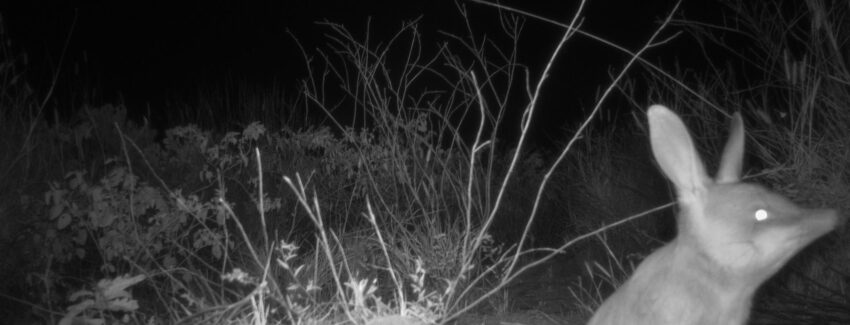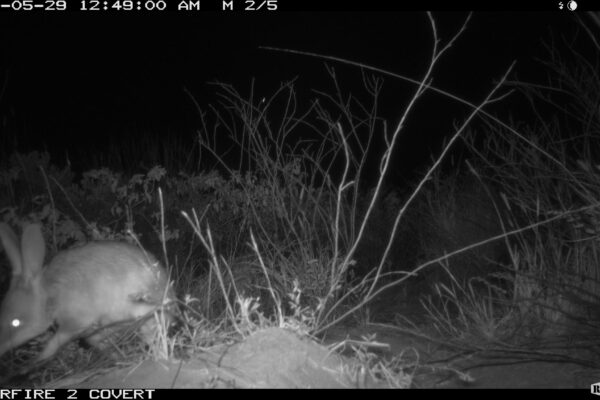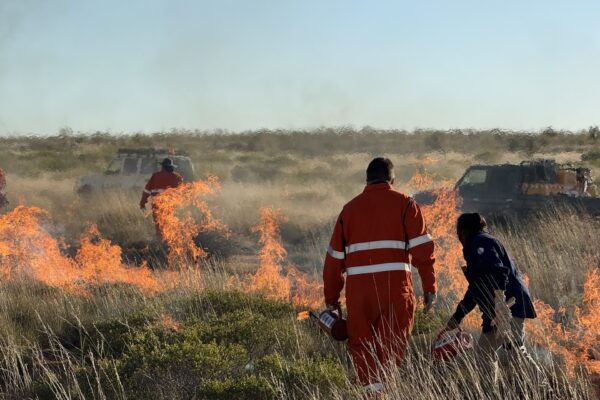At Terra Rosa, we are proud to work alongside the Budadee Aboriginal Rangers and the Department of Biodiversity, Conservation and Attractions (DBCA) on an important bilby conservation project at Tharra Karnparnmana Aboriginal Reserve. This work is part of the first Matter of National Environmental Significance project under the Pilbara Environmental Offsets Fund, and reflects our commitment to supporting Traditional Owner aspirations through conservation, heritage management, and on-Country training.
Building Knowledge Before Action
Our involvement began with extensive survey work carried out in collaboration with Budadee Rangers and DBCA. These surveys provided critical baseline information about bilby populations and habitat in the region. The results guided the next steps for land management and led Traditional Owners to recommend fire management as a tool to improve conditions for bilbies and other native species.
Record-Breaking Bilby Detections
During these surveys, we recorded 22 bilby detections — the highest number ever documented in the Pilbara. This significant achievement highlights the ecological value of the reserve and the importance of collaborative monitoring. It also demonstrates how combining Traditional knowledge with scientific survey methods can deliver strong, evidence-based outcomes that guide long-term conservation planning.
Why Cultural Burns Matter
Following the surveys, cultural burns were introduced as a management action. Unlike ecological burns, which are often large-scale and focused on reducing fuel loads, cultural burns are small, cool, and guided by thousands of years of Traditional knowledge.
There has been growing concern across WA about prescribed burning, particularly after recent burns in the South West impacted old-growth tingle trees. These ecological burns were conducted in areas with extremely dense vegetation, making them unsuitable for low-intensity fire and leading to unintended damage.
In contrast, the cultural burns carried out by Budadee Rangers in the Pilbara are:
-
Small and cool, deliberately low intensity to avoid harming mature trees and wildlife.
-
Conducted in open landscapes with much lower vegetation density, making them safe and effective.
-
Timed to seasonal conditions so the fire supports regeneration of native plants that sustain bilbies and other species.
The burns are carefully planned and delivered. Pre-burn scans ensure wildlife can be cleared or relocated from burn areas, while post-burn monitoring allows rangers to track vegetation recovery and the return of animals. By breaking up dense spinifex, cultural burns encourage the regrowth of saplings and young plants, which provide better food sources and habitat for bilbies. This patchwork approach restores balance across Country, reduces wildfire risk, and strengthens biodiversity.
Purpose and Impact
All of this work aligns with the Budadee Ranger training program, building trainee’s skills in ecological monitoring, cultural fire management, and conservation leadership. For Budadee, the project not only strengthens cultural practices but also creates meaningful employment pathways and recognition of Traditional knowledge as central to land management.
For Terra Rosa, the purpose of being part of these projects is clear: to support Traditional Owner-led conservation, to combine heritage expertise with biodiversity outcomes, and to help safeguard endangered species like the bilby while caring for Country in culturally appropriate ways.
By working together, we are achieving outcomes that protect biodiversity, empower Aboriginal rangers, and set a standard for sustainable, culturally grounded land management in the Pilbara.
Interested in learning more, head to Budadee’s Caring For Country page.
Are you located in the Pilbara and concerned about how the cultural burns might impact you? Check out the map of upcoming cultural burns locations and dates here.



